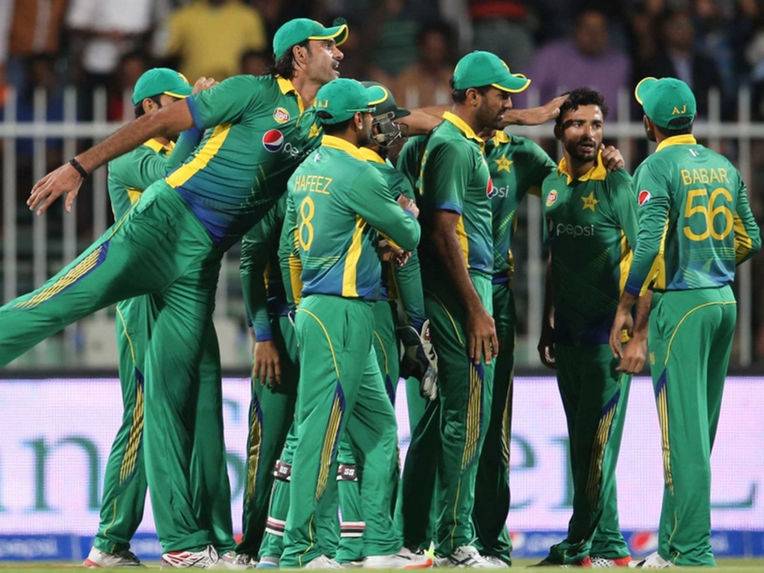Where was the substance? Where were the heroics? Is this the same scintillating, young Pakistani line-up that rocked Sri Lanka left-right-center this July? A crushing series defeat of 3-1, and that too at the hands of England, has left the world questioning Pakistan's knack for ODI cricket. Despite Mohammad Irfan's consistent luck with the new-ball, and Mohammad Hafeez's leading run-scorer title, lack of team effort cost Pakistan a great shot at victory.
It was a different story in the first game. As always, Pakistan's bowling championed their road to victory, with the Anwar-Irfan partnership evoking some serious bounce and purchase off the Abu Dhabi deck. 216 to chase down under lights? No problem. With 11 spectacular boundaries to his credit, including a majestic six over the onside, Mohammad Hafeez's unbeaten 102 saw Pakistan over the line with 6 wickets to spare. Pretty smooth, Professor.
From that point onward, however, the men in green sought a world of satisfaction in a single victory. This led to the absence of a follow-up plan, allowing the power to shift from the hosts to the visitors. In the second game, Alex Hales spearheaded England's reworked batting approach with a dazzling ton, taking on spin-maestro Yasir Shah at a strike rate of 128. The result was a challenging total of 283, made easier by Pakistan's endless love for the short-ball; a futile obsession.
Chris Woakes and David Willey, bowlers with little pace and craft, proved threatening enough to bag seven wickets in the space of 16 overs. Cross-batted strokeplay, and needless improvisation from the Pakistani batsmen, resulted in 10 dismissals under the score of 24, including class-acts Shoaib Malik and Azhar Ali. Thus, the men in green could only call it a night after being bowled out for 188. An exciting T20 total though.
Moreover, when home-advantage is a title associated with a side, it becomes imperative for the team to defend and chase with equal class. Since Pakistan had little luck accomplishing the former, the third game in Sharjah granted the side an opportunity to bat first, for the first time in the series. Babar Azam's sound negotiation with the new-ball helped him develop a partnership of 45 with Hafeez, adding some sense of stability to the game. The effort, coupled with two succeeding partnerships of over 40, propelled Pakistan to 132 for 3 in 29 overs. This served as a fantastic take-off platform, which was once again, poorly utilized. Mohammad Rizwan and Shoaib Malik, the in-form aggressors of Pakistan's middle-order, owed their wickets to two ludicrous run-outs. Had it not been for Wahab Riaz's lower-order blitz of 33 from 35 balls, even an average total of 208 would have been an impossibility. Jos Buttler's reverse-sweeps blended perfectly with James Taylor's run-a-ball grace, producing a partnership of 117 runs for England; another taste of victory for the British.
The most critical lapse in this series from Pakistan's perspective, was the death-over annihilation of the seamers, especially in the last game. By the end of the 45th over, as Jos Buttler closed in on the fastest ton by an English player, juicy full-tosses from Anwar Ali and Wahab Riaz allowed the batsman to free his arms, and thwack the pacers for six gigantic sixes into the stands. The result was 116 runs off 52 balls, the seventh fastest century in the history of ODI cricket! It was an exhibition of brute force and meticulous placement, treating Sharjah spectators to flicks, pulls, drives and reverse-sweeps of the highest quality. The last 10 overs yielded 129 runs, helping England secure a mammoth total of 355. Still one of the best bowling attacks in the world? Time to rethink that.
Pakistan's chase was marked by starts of 30s and 40s, as Azhar Ali and Mohammad Hafeez yet again failed to transform these numbers into match-defining figures. Shoaib Malik and Babar Azam, with 8 fours and 3 sixes between them, were the only two leading some fight from Pakistan. By fearlessly charging down the track to opposition bowlers, the duo registered impressive half centuries to their names, before loose shots owed to a finishing total of 277.
This series marks Pakistan's second successive ODI defeat to England in the UAE, following the 4-0 whitewash in 2012. It is a sheer pity to learn that no fruitful lessons have been extracted since then in confronting England on home soil. A neglected overall batting technique, coupled with wavered bowling, has rendered the men in green high on pride, and low on delivery. England on the other hand, have silenced critics with a clinical ODI victory, and will have their eyes set on the upcoming T20 clash.






